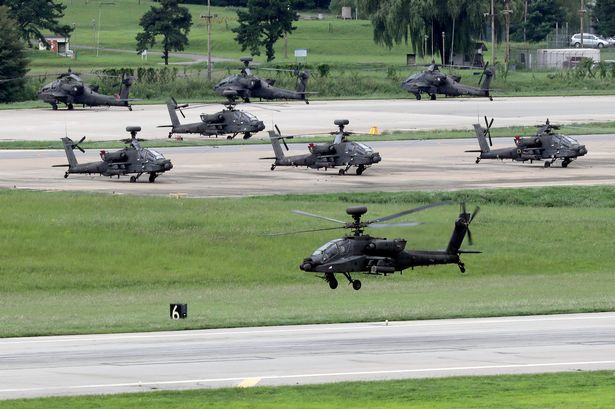S. Korea pushes for withdrawal of guard posts from DMZ

A view of Camp Humphreys, a US Forces Korea base in Pyeongtaek, Gyeonggi Province, in this file photo. AP
SEOUL — The Defense Ministry said Tuesday it will seek to withdraw troops and equipment from guard posts inside the Demilitarized Zone, pledging to transform the heavily fortified area into a symbol of peace between the two Koreas.
In a briefing to lawmakers, the Ministry of National Defense said the withdrawal plan would be sought “on a trial basis” until the conditions are in place for a complete withdrawal, following environmental and historical research on the cross-border region.
The ministry said the measure is part of efforts to implement the Panmunjom Declaration made at the inter-Korean summit on April 27. President Moon Jae-in and North Korean leader Kim Jong-un agreed to cease all forms of hostilities and replace the current armistice with a peace agreement.
“The ministry is seeking to reduce the number of personnel for guard posts, adjust the number of heavy-fire equipment and resume free exchange of people,” the ministry said in a document submitted to the parliamentary defense committee.
“Following the withdrawal of (troops and equipment) from the DMZ on a trial basis, the ministry will push for a complete withdrawal in line with research on environment conditions and historical sites.”
Article continues after this advertisementUnder the armistice agreement signed after the 1950-53 Korean War, the two Koreas are prohibited from military activities deemed hostile to each other. Yet the two Koreas have increased their military presence, at times engaging in provocations.
Article continues after this advertisementWhile expectations were high that the two Koreas would take specific steps to return the heavily fortified DMZ to its original state, a series of inter-Korean military talks held since the Moon-Kim summit have failed to make any significant breakthrough.
The Defense Ministry also pledged to launch a joint program with North Korea and the US to excavate war remains inside the DMZ, adding that it would consider a plan to have South Korea involved with efforts to excavate US war remains inside North Korea.
“In order to simultaneously implement the Panmunjom Declaration and the Sentosa Agreement (from the first-ever US-North Korea summit), the Defense Ministry will push for a joint excavation program among the two Koreas and the US,” the ministry said.
Meanwhile, Defense Minister Song Young-moo was found to have delayed the process of briefing Cheong Wa Dae about a controversial martial law document — even after the defense security commander described it as a “grave issue.”
Defense Security Commander Army Gen. Lee Suk-koo told lawmakers that he reported the document to Song on March 16.
It came after a human rights group raised the allegation that the military considered issuing a garrison decree during the candlelight protests last year, Lee said.
Song has been suspected of holding out on briefing the Blue House for three months after being informed about the martial law document in March. Song said he made the decision out of “political consideration” amid an inter-Korean detente in the run-up to the April 27 summit.
“I told Minister Song that it was serious situation, and he also took it seriously,” said Lee. “Under the instruction of the Defense Ministry, I gathered information about a garrison decree and reported the information to the minister.”
Controversy continues to mount over the martial law document drafted by the Defense Security Command, which included a plan to deploy tanks in downtown Seoul, censor media and block lawmakers from ending the emergency action.
In a document submitted to lawmakers, the Defense Ministry pledged to overhaul the Defense Security Command, including changes to the military intelligence unit’s name, mission statement and organization.
“If necessary, we will consider ways to fundamentally readjust the command, including changing its name, character and where it belongs,” the ministry said. “We will completely eliminate possibilities of the command’s interference in politics and abuse of power.”